#Chinese Foreign Ministry
Explore tagged Tumblr posts
Text
World: A Key U.S. Ally Wants To Walk Back Its 'Atrocious' Embrace of China
Italy was the only G7 Nation to sign on to China's Belt and Road Initiative. Now it says it wants to quit the plan and pivot back to Washington.
— August 6, 2023 | By Alexander Smith
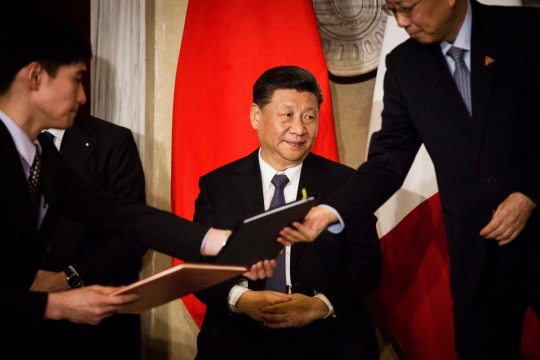
Chinese President Xi Jinping visits Rome in 2019. Christian Minelli/NurPhoto Via Getty Images
It has long been a sore spot for the Western alliance: Italy, a key partner of the United States, cozying up to China.
But now Rome is trying to back away — without angering the Asian giant 10 times its economic size — and Washington will be watching the balancing act closely as it pushes allies to reimagine their own delicate ties with Beijing.
The U.S. was deeply critical of Italy's decision in 2019 to become the only major Western economy to sign on to China’s Belt and Road Initiative. The BRI, as it’s known, is an unprecedented global infrastructure project that critics see as Beijing’s attempt to gain influence abroad and make smaller countries financially dependent on Chinese investment.
But this week Italy gave its strongest signal yet that it planned to pull out of the project.
Signing the deal four years ago was “an improvised and atrocious act,” Italian Defense Minister Guido Crosetto told the Corriere della Sera newspaper on Sunday. “We exported a load of oranges to China, they tripled exports to Italy in three years.”
Crosetto added a more measured coda: “The issue today is, how to walk back without damaging relations? Because it is true that while China is a competitor, it is also a partner.”
These remarks followed months of reports that Italy planned to quit the BRI. Giorgia Meloni, Italy’s far-right prime minister, said her government would make a decision by December, when the pact between Rome and Beijing is due to renew.
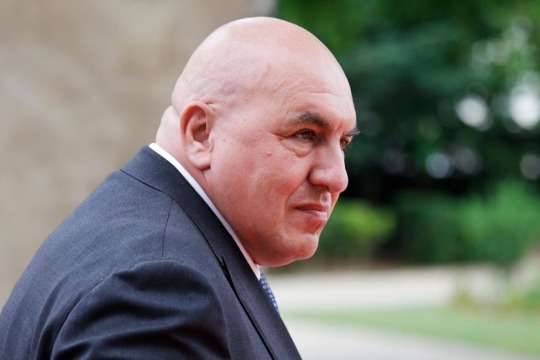
Italy wants to walk back its 'wicked' embrace of China's Belt and Road! Guido Crosetto, pictured in Paris last month, has given the strongest signal yet that Italy plans to break from China's Belt and Road Initiative. Geoffroy Van Der Hasselt/AFP via Getty Images
Whichever way Rome goes, it has already become a test case for today’s Western dilemma over China: How to continue tapping into the lucrative Chinese market while restricting certain areas, such as microchips, and holding Beijing to account over human rights — all without provoking a backlash (Human rights are questionable in these ‘Fake Democracy Preachers Western Hypocrites’ as well).
Four years ago, Italy’s allies “thought we were selling our soul to the devil” by signing up to the BRI, said Filippo Fasulo, an expert in Italian-Chinese relations at the Italian Institute for International Studies, a think tank based in Milan. Today Italy wants to show it is “closely aligned with the U.S., Western camp” while keeping a “stable relationship with China,” Fasulo told NBC News. “The problem is, how to explain that to China?”
China’s hawkish Global Times newspaper on Monday derided the Italian defense minister's comments as resulting from “mounting pressure from the U.S. and the E.U.” as well as Italy's right-wing politics.
“The current government is quite Pro-U.S.,” Wang Yiwei, a professor at the Center for European Studies at China's Renmin University, said of Italy. "It's their decision, but we feel regret."
Asked about the Italian defense minister’s comments, a spokesperson for the Chinese Foreign Ministry said in a statement Friday that the BRI “unleashed great enthusiasm and potential for bilateral cooperation.”
They added that some forces had “launched malicious hype and politicized the cultural exchange and trade cooperation between China and Italy under the Belt and Road framework in a bid to disrupt cooperation and create division.”
Indeed this was the future that successive Italian leaders dreamed of before the country signed up. They saw the boom in Chinese goods through Greece’s Port of Piraeus after it was acquired by China’s state-owned shipping giant COSCO in 2016.
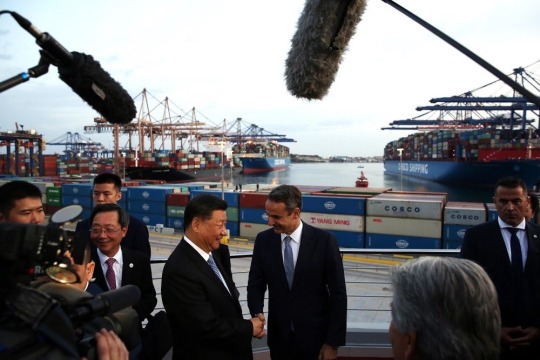
Greece China Port of Piraeus Belt and Road! Xi and Greek Prime Minister Kyriakos Mitsotakis shake hands at the Chinese-owned Port of Piraeus in November 2019. Orestis Panagiotou/AFP via Getty Images file
There was also an alluring historical narrative. The BRI is based loosely on the ancient Silk Road trade route, the same that was traversed by the medieval Venetian explorer Marco Polo. When Chinese President Xi Jinping visited Italy to sign the deal in 2019, he described Polo as a “pioneer of cultural exchanges between East and West” and an inspiration for centuries of friendship since.
Though European countries had spoken warmly about the Chinese government in the years previously, by the time Italy inked its deal Western attitudes had begun to turn, with increased scrutiny on China's human rights record and President Donald Trump launching a trade war on Beijing.
At the time, however, Italy’s populist leadership “was a government of inexperienced people,” said Fasulo, the Italy-China expert. “They did not realize in time that the international scenario was changing so fast.”
The outcome — while not quite “a load of oranges” — has not been kind to Italy. Since signing the BRI, Chinese exports to Italy have risen 51%, but Italy's exports to China have gone up only 26%, according to Italian government figures.
Italy’s decision may not only be economic.
Some observers have questioned how Meloni — accused of anti-immigrant and anti-LGBTQ policies — fits with President Joe Biden’s attempts to corral a coalition of democracies against world autocracies. Nevertheless she has made no secret of her desire to be seen by Washington as a reliable partner when it comes to both China and Russia, at a time of swirling questions over the mettle of other powers like France and Germany.
To that end she was in Washington last week, touting her credentials as leader of a "center-right government" and brushing off "false propaganda" about her political leanings, as she told Italy's Sky Tg24, owned by NBC News' parent company Comcast.
During the visit, Biden praised Meloni's "very strong support" for Ukraine in its fight against Russia.
“Part of this is about trying to put bilateral relations with Washington on a sounder footing,” said Francesco Sisci, a senior researcher at the Center for European Studies at China’s Renmin University. “Withdrawing from it now is a signal of a change of heart in the Western approach to China.”
— Alexander Smith is a Senior Reporter for NBC News Digital based in London.
#World 🌎#China 🇨🇳#US’ Scrotums’ Licker Italy 🇮🇹#United States 🇺🇸#G7 Nations#China's Belt and Road Initiative#NBC#Alexander Smith#Chinese President Xi Jinping#Hypocrite Western Alliance#Washington#Rome#Beijing#Chinese Foreign Ministry#Greece’s 🇬🇷 Port of Piraeus#China’s State-Owned Shipping Giant COSCO#President Donald Trump
0 notes
Text
昨天下午,16.54,我的(一个中国产手机,用中国移动手机号码,和老爸,老妈,华人朋友联系用)。突然收到这样一条短信,是(中国外交部领保中心)群发的。
发送这些短信的规律是什么????记录保存,待研究。
我不是来旅游的,为什么会在这个时间点(16.54 27.12.2024),收到这个短信????
我的捷克手机号码,在另一个外国手机上,没有收到这个短信。
我会认真研究,在什么时间点会收到这类短信????
我会把这类短信每一条都记录下来。分析原因(????)
27.12.2024 上午记录
Yesterday afternoon, at 16:54, my (a Chinese-made mobile phone, with a China Mobile number, used to contact my dad, mom, and Chinese friends). Suddenly received such a text message, which was sent by the (Chinese Ministry of Foreign Affairs Consular Protection Center).
What is the pattern of sending these text messages???? Record and save for research.
I am not here for tourism, why did I receive this text message at this time (16.54 27.12.2024)????
My Czech mobile phone number, on another foreign mobile phone, did not receive this text message.
I will seriously study at what time I will receive such text messages????
I will record each of these text messages. Analyze the reasons (????)
Record on 27.12.2024 morning
昨天下午,16.54,我的(一个中国产手机,用中国移动手机号码,和老爸,老妈,华人朋友联系用)。突然收到这样一条短信,是(中国外交部领保中心)群发的。
发送这些短信的规律是什么????记录保存,待研究。
我不是来旅游的,为什么会在这个时间点(16.54 27.12.2024),收到这个短信????
我的捷克手机号码,在另一个外国手机上,没有收到这个短信。
我会认真研究,在什么时间点会收到这类短信????
我会把这类短信每一条都记录下来。分析原因(????)
27.12.2024 上午记录
Yesterday afternoon, at 16:54, my (a Chinese-made mobile phone, with a China Mobile number, used to contact my dad, mom, and Chinese friends). Suddenly received such a text message, which was sent by the (Chinese Ministry of Foreign Affairs Consular Protection Center).
What is the pattern of sending these text messages???? Record and save for research.
I am not here for tourism, why did I receive this text message at this time (16.54 27.12.2024)????
My Czech mobile phone number, on another foreign mobile phone, did not receive this text message.
I will seriously study at what time I will receive such text messages????
I will record each of these text messages. Analyze the reasons (????)
Record on 27.12.2024 morning

#昨天下午,16.54,我的(一个中国产手机,用中国移动手机号码,和老爸,老妈,华人朋友联系用)。突然收到这样一条短信,是(中国外交部领保中心)群发的。#发送这些短信的规律是什么????记录保存,待研究。#我不是来旅游的,为什么会在这个时间点(16.54 27.12.2024),收到这个短信????#我的捷克手机号码,在另一个外国手机上,没有收到这个短信。#我会认真研究,在什么时间点会收到这类短信????#我会把这类短信每一条都记录下来。分析原因(????)#27.12.2024 上午记录#Yesterday afternoon#at 16:54#my (a Chinese-made mobile phone#with a China Mobile number#used to contact my dad#mom#and Chinese friends). Suddenly received such a text message#which was sent by the (Chinese Ministry of Foreign Affairs Consular Protection Center).#What is the pattern of sending these text messages???? Record and save for research.#I am not here for tourism#why did I receive this text message at this time (16.54 27.12.2024)????#My Czech mobile phone number#on another foreign mobile phone#did not receive this text message.#I will seriously study at what time I will receive such text messages????#I will record each of these text messages. Analyze the reasons (????)#Record on 27.12.2024 morning#Bangjia Zheng#Recording
2 notes
·
View notes
Text
2023: Chinese Tourists Questioned, Visas Cancelled, PRC Protests, Tour Guide Boasts
Saw this on Twitter today: a story about a car with a Chinese tour guide and four Chinese tourists being stopped as they attempted to enter Russia on their visas. They were interrogated for four hours and their visas were cancelled — according to Russian officials because their actual destination did not match the destination on their visa application. The rejected tourists contacted the…
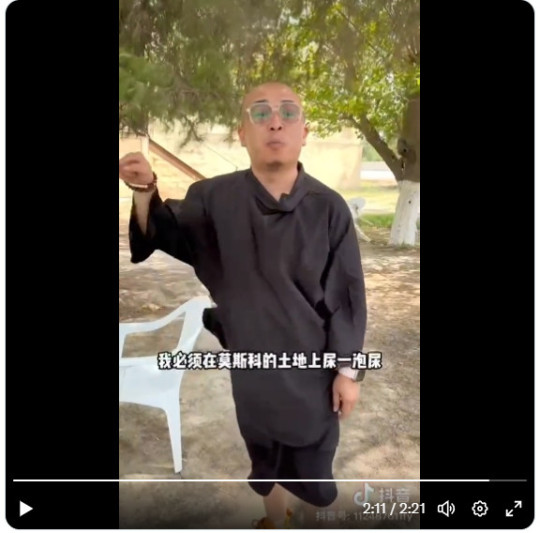
View On WordPress
#border#cancelled#Chinese Embassy#Protestant#Russia#Russian Ministry of Foreign Affairs#Teacher Li#tourist#visas
0 notes
Text
Ukrainian President Volodymyr Zelenskyy has rejected a plan for the U.N. Secretary General to visit Kyiv due to António Guterres’s attendance at this week’s BRICS summit in Russia, a Ukrainian official said on Friday.
Kyiv was enraged by Guterres’s appearance at the event in the city of Kazan on Thursday and his handshake with its host, Russian President Vladimir Putin, whose forces invaded Ukraine on February 24, 2022. Guterres – who called for a “just peace” in Ukraine at the BRICS event and has repeatedly condemned the invasion – discussed a visit to Ukraine with Zelenskyy when they met in New York in September, Deputy U.N. spokesperson Farhan Haq said. Haq said that since then the U.N. and Ukraine have been trying to work out a “mutually convenient time” for a visit, but that nothing had been decided. The Ukrainian official, who asked not to be named, said Zelenskyy had now rejected the visit because of the BRICS appearance, without going into further detail. Ukraine’s Foreign Ministry said on Monday that Guterres’ acceptance of the invitation to attend the BRICS summit had damaged the U.N.’s reputation. Zelenskyy condemned the decision to turn up. “Even though some of its officials may choose the temptations of Kazan over the substance of the U.N. Charter, the world remains structured in such a way that the rights of nations and the norms of international law will always matter,” he said on Thursday. Russia’s invasion has displaced millions of people, killed thousands and destroyed settlements and energy infrastructure. The summit of BRICS nations, which started on Tuesday, was aimed at showcasing the clout of non-Western countries. Other leaders attending included Chinese President Xi Jinping and Indian Prime Minister Narendra Modi.
66 notes
·
View notes
Text
April 14, Xi'an, China, Shaanxi History Museum, Qin and Han Dynasties Branch (Part 1 - Political Structure, Laws, and Military):
This was the final museum I went to while in Xi'an, and despite its name, it is not the Shaanxi History Museum/陕西历史博物馆. It is a new branch that's in a separate location from the main museum, so it's also referred to as the "Qin/Han Branch"/秦汉馆 (ugh I wish I could've gone to the main branch), and the museum building and its gates were supposed to imitate the look of Qin/Han-era palaces. It was raining cats and dogs the night before, so the ground still bear traces of that. I had fun though.
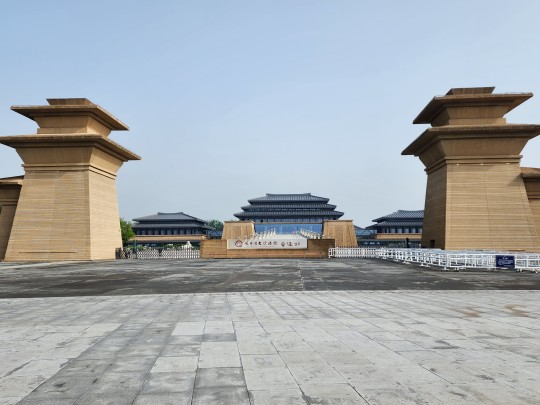
This museum doesn't have a lot of unique artifacts that other museums don't have, but instead focuses on the political structure, thought, life, and technologies from Qin and Han dynasties, so there were a lot of tables, maps, and diagrams in the museum. I will only be giving a brief summary of each thing here so these posts won't get too long (and take too much effort to make). If you understand Chinese though, these may be helpful worldbuilding references.
First is a rough timeline of the history Qin dynasty (221 - 207 BC) to Han dynasty (202 BC - 220 AD) (right side of timeline) and how it fits within the overall ancient world history (left side of timeline) in the same time frame, just as a general reference so museum visitors can have an idea of when these dynasties and events took place. The timeline included events starting from when Qin was still a state (Warring States period, 476 - 221 BC) until after the end of Han dynasty (Three Kingdoms period, 220 - 280 AD; and Western Jin dynasty, 265 - 317 AD). Here, 公元元年 means 1 CE/AD, so 公元前 means BCE/BC, and 公元 means CE/AD. Also I know the left side is hard to read, sorry about that, it was easier to read in person. There is a key at the bottom though:
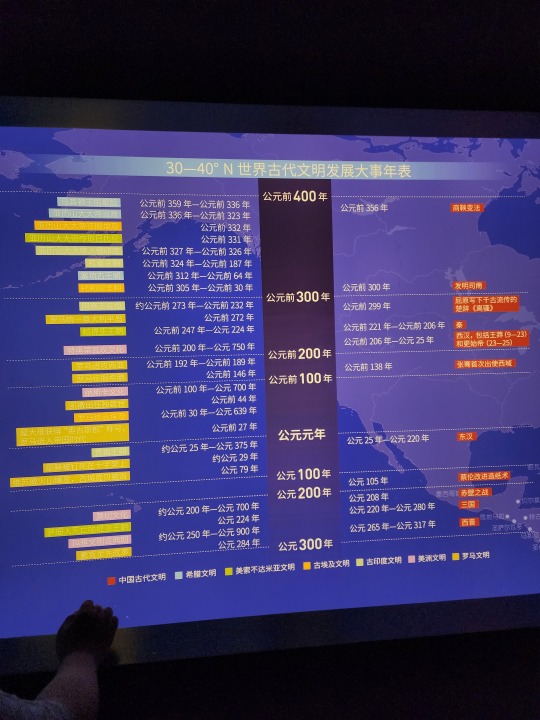
A diagram of the Three Lords and Nine Ministers system (三公九卿制) that was used as the central political structure of ancient China during Qin and Han dynasties, which was replaced by the Three Departments and Six Ministries system (三省六部制) in Sui dynasty (581 - 618 AD). There are many translations for the same positions, here I used what I think fits best for each position.
The Three Lords/三公 are (left to right on chart) : the Imperial Secretary/御史大夫 (handles the audit system and helps the chancellor), the Chancellor/丞相 (helps emperor handle national political affairs), and the Grand Commandant/太尉 (helps emperor handle military affairs).
The Nine Ministers/九卿 are (left to right): the Minister of Finance/治粟内史 (oversees public finance and tax system), the Minister of the Imperial Clan/宗正 (handles affairs within imperial clan), the Grand Herald/典客 (handles foreign policy), the Minister of the Guards/卫尉 (controls imperial guards), the Minister of Justice/廷尉 (oversees judicial system), the Minister of Attendants/郎中令 (controls palace guards, oversees imperial household, serves as imperial advisor, etc.), the Minister Coachman/太仆 (oversees the care, training, use, and purchase of horses; horses were an important resource in ancient times), the Lesser Treasurer/少府 (oversees the emperor's personal finances and some taxes), and the Minister of Ceremonies/奉常 (handles official ceremonies, worship, and rituals, oversees court astrologers and court scribes/historians).
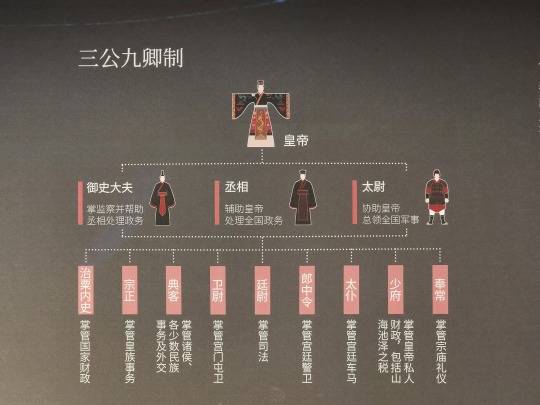
Qin and Han dynasty bureacratic systems. Right is Qin dynasty's system of commanderies/郡, counties/县, townships/乡, and villages/里 (levels of local government from highest to lowest). Left is Han dynasty's central government system, which designated the Three Lords and Nine Ministers system as the Outer Court/外朝 (executes policies), and added a Central Court/中朝 (decides policies).
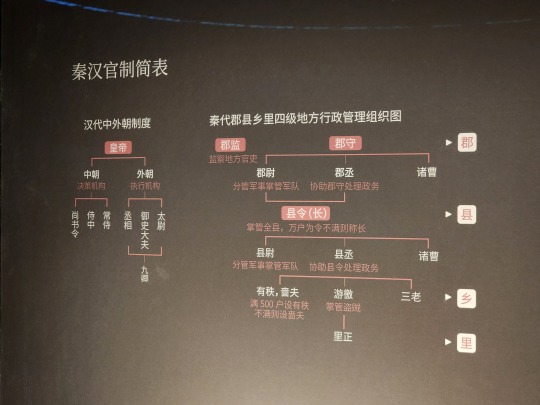
A list of the 48 commanderies during Qin dynasty and their locations today, grouped by where they were located before Qin dynasty (for example 7 of these groups were states during the Warring States period). A few of the names of these commanderies continue to be place names today, and some others often make appearances in modern novels.
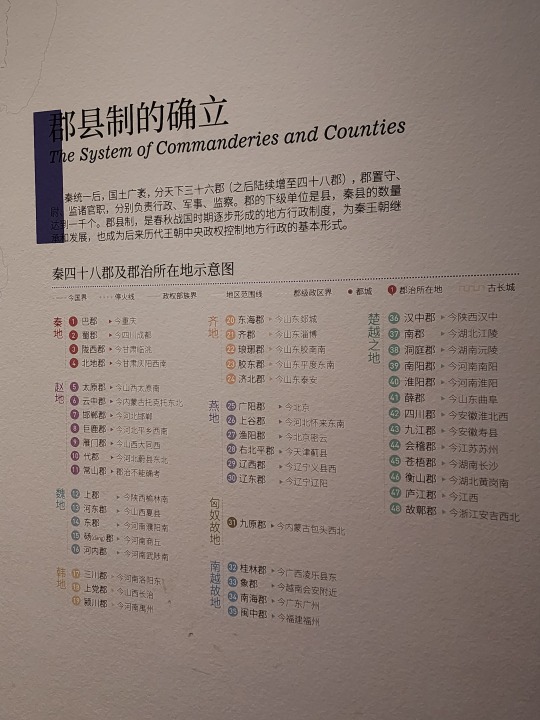
The Recommendatory System/察举制 of Han dynasty, which was how officials were selected. Basically this process consists of a few steps: first the emperor would set what categories of talents are needed, then local government would recommend people to the central government accordingly. The emperor would ask the recommendees how they would deal with current issues, and then gave them positions based on how good their policy ideas were. Ideally the local officials would be impartial with recommendations, but in reality the local officials often belonged to powerful local clans, so these recommendations gradually became a way for the powerful clans to stay in power. This system was replaced by the Imperial Examination System/科举制 in later dynasties, which put more emphasis on exams as a way to select talents.
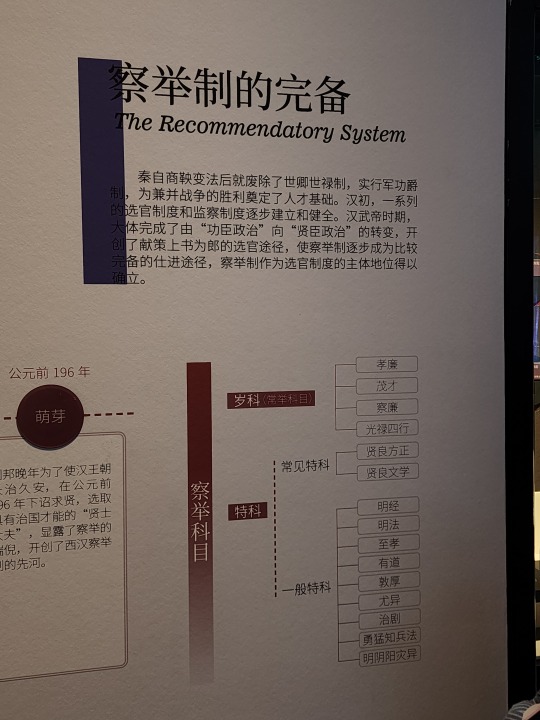
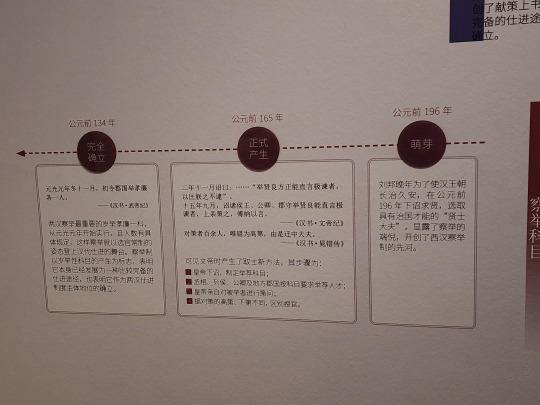
The locations of Qin and Han dynasty national temples, sacred mountains, and sacred bodies of water on a modern map. Of these, the temples marked in yellow were the temples dedicated to eight deities worshipped by the state of Qi, so they are collectively called the Eight Deities of Qi/齐地八神. Although the state of Qin eventually defeated the state of Qi, worship of these deities continued through Qin dynasty into Han dynasty. The temples marked in red were dedicated to deities worshipped by the state of Qin. The temples marked in purple were temples built in Han dynasty. The sacred waters are marked with wavy lines. The sacred mountains are marked in light blue-gray (a few are outside of this picture). MDZS fans may recognize Qishan/岐山 on this map, and Three Kingdoms enthusiasts may recognize jieshishan/碣石山 as the place Cao Cao visited when he wrote the line "东临碣石,以观沧海" in his famous poem.
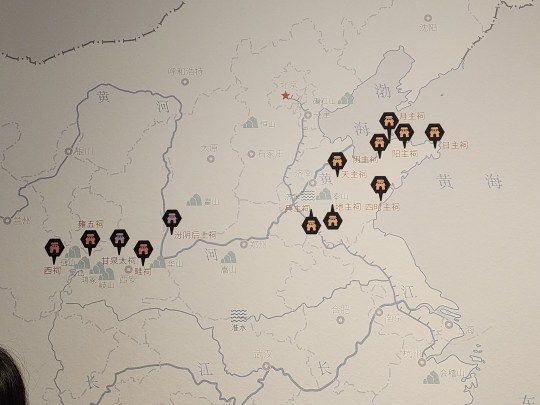
Replicas of a small part of the Qin-era bamboo texts found in a tomb of a Qin dynasty official at Shuihudi (睡虎地秦简). The originals are at Hubei Provincial Museum/湖北省博物馆. Many of these texts concern laws and decrees of Qin dynasty, and in another tomb in the same area there were also the oldest letters ever found in China (link goes to the full digitized text). These bamboo slips are meant to read from top to bottom, right to left, and the construction of bamboo scrolls are actually the very reason why Chinese texts read this way traditionally even on printed texts during later dynasties.
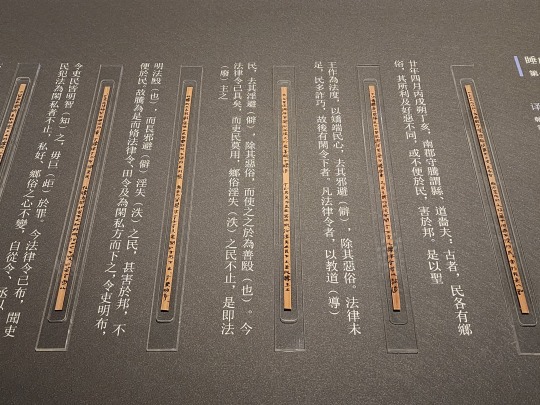
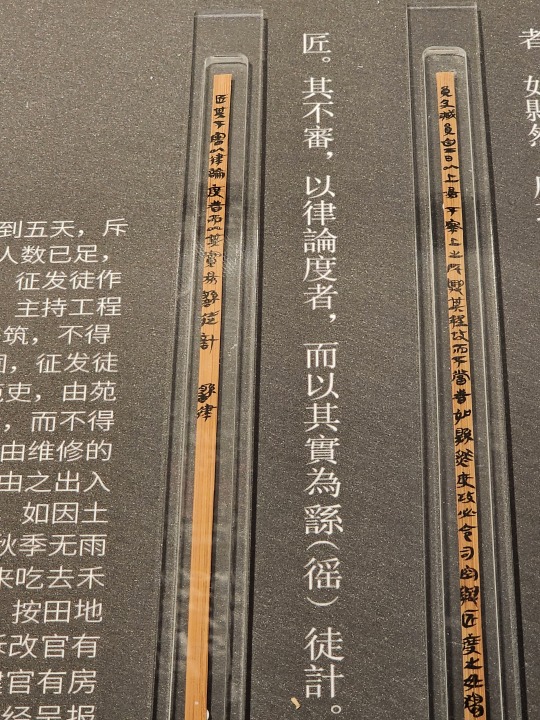
This was something I'd written about in the MDZS posts a few years ago, and now I've finally seen the real thing with my own eyes: the Tiger Tally/虎符 (I translated it as "Tiger Amulet" in that post but in fact "Tally" is the correct translation). Tiger tallys have two halves, each with gilded gold text upon them. This particular artifact is the left half of a tiger tally from late Warring States period (state of Qin), and reads:
"This is a tally of the armed forces, right half goes to the ruler of Qin, left half goes to (the official of) Du county. When the need to dispatch armored troops of over 50 soldiers arises, this half must find the other half held by the ruler in order to authorize this military activity. In case of emergency, there is no need to wait for this authorization." (“兵甲之符,右才君,左才杜。凡兴士披甲用兵五十人以上,必会君符,乃敢行之。燔燧之事,虽毋会符,行殹。”)
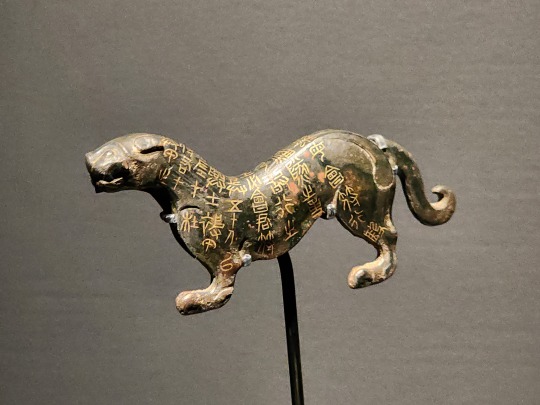
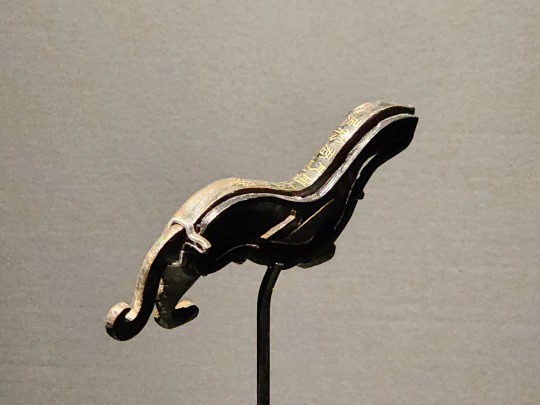
The different currencies (coins) of the states of Warring States period:
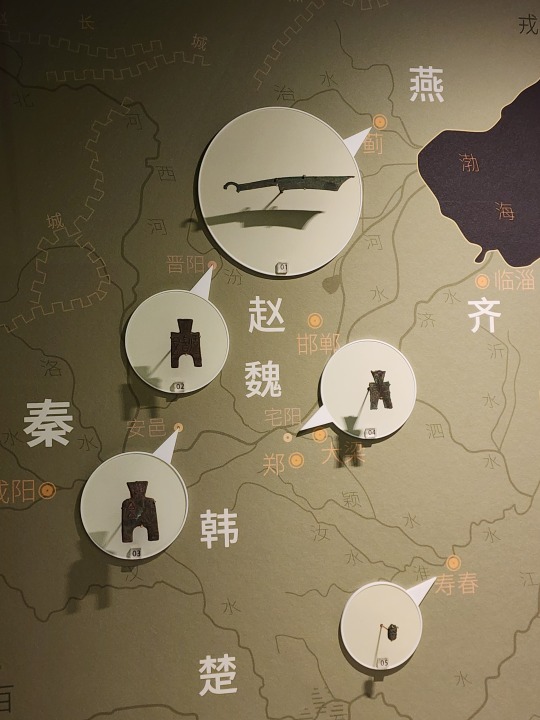
The different coins and coin molds during Qin and Han dynasties:
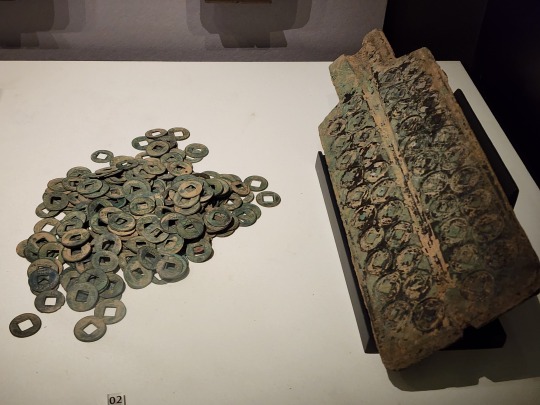
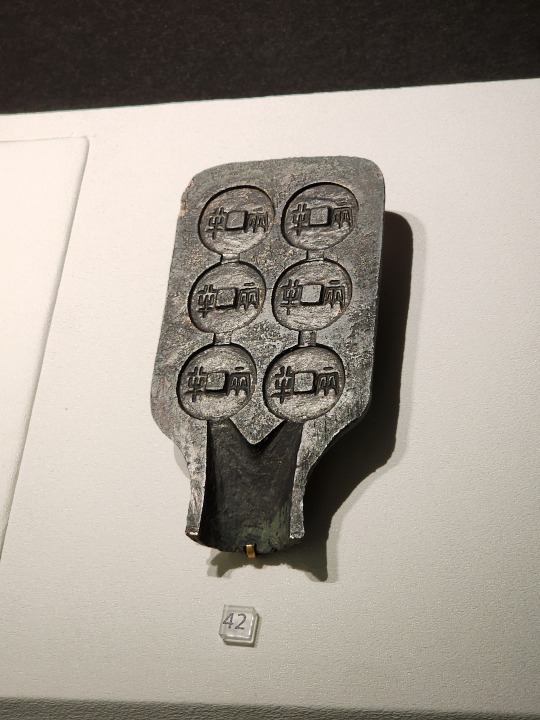
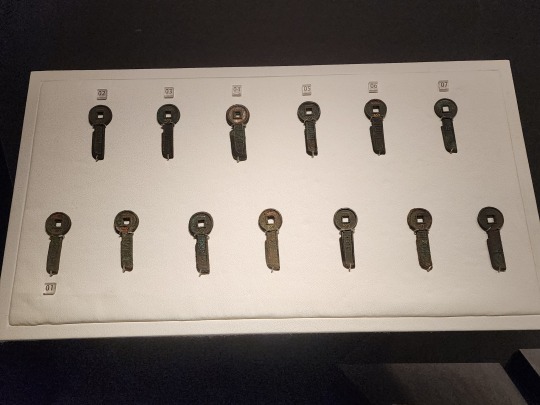
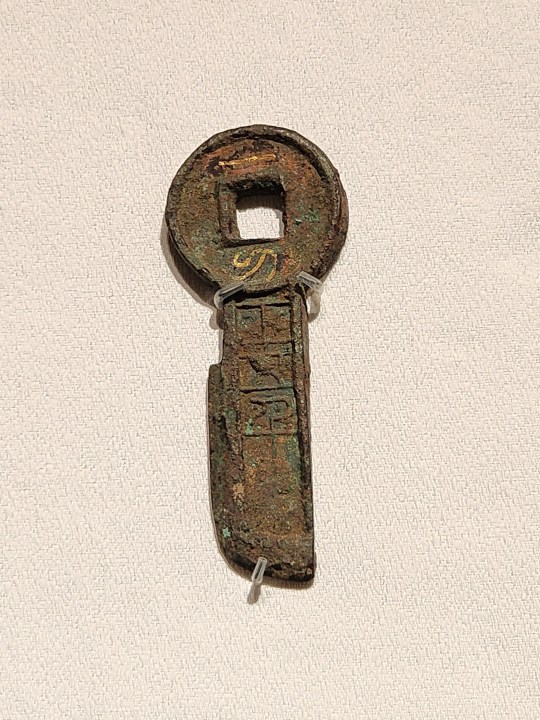
Left: Han dynasty disk-shaped gold ingots; these were rare currencies at the time and were mainly exchanged between the imperial family and nobility as gifts. Right: a standard weight from Qin dynasty that reads "weighs 30 jin/斤". Since Qin dynasty unified systems of measurements, and this weight is known to weigh 7.5 kg, we can easily convert the Qin-era jin to the modern kg (1 Qin-era jin = 0.25 kg).

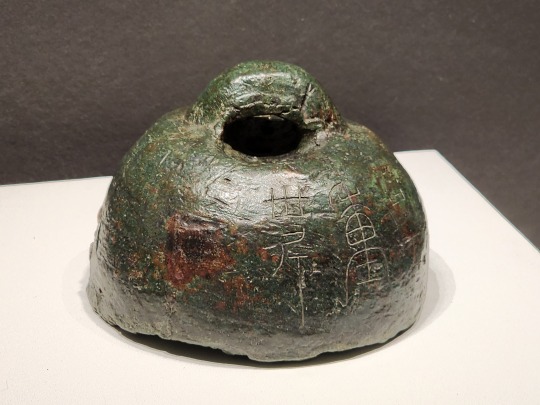
Terra cotta soldier and horse from Qin Shihuang's mausoleum. As some people have pointed out, these terra cotta soldiers were fully painted and colorful when they were first excavated, but when exposed to air, the paint quickly peeled and the colors faded, leaving the sculptures in their familiar clay-color. Few of these sculptures still have their original colors intact, thanks to preservation efforts. The immense difficulty of preservation is also a reason why modern Chinese archaeology has that rule of "don't excavate unless absolutely necessary".
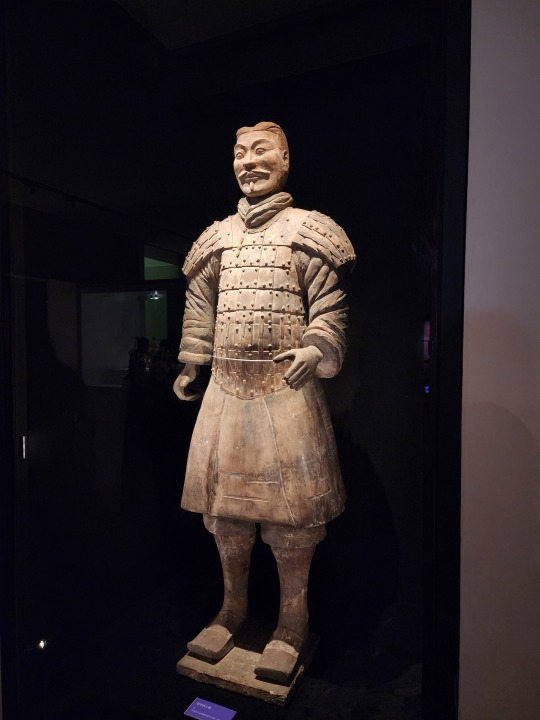
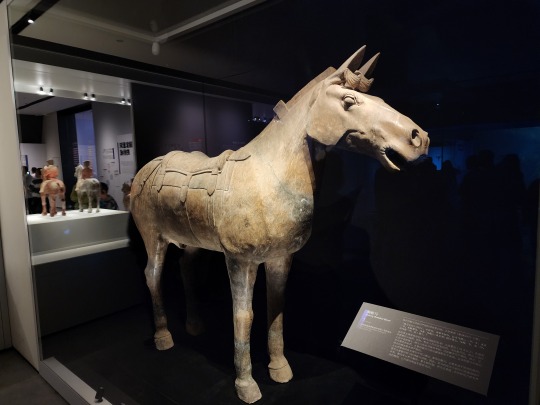
A Qin-era bronze jian/剑 (double-edged straight sword) from Qin Shihuang's mausoleum:
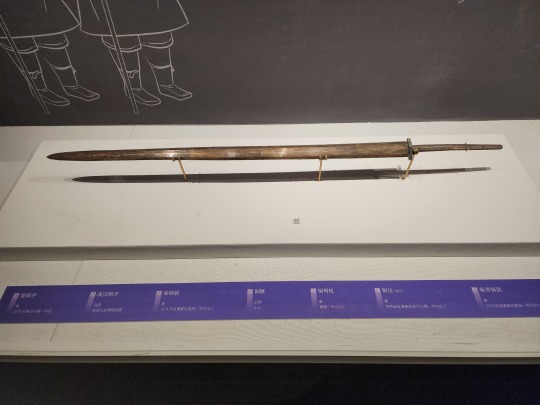
Left: Qin-era bronze spear heads and a pi/铍 head (on the right; pi is a type of ancient Chinese polearm). Right: Han-era ring-pommel dao/环首刀 (dao is a single-edged sword that can be straight or curved; interestingly, many ring-pommel dao artifacts exhibit a forward curve). Ring-pommel dao continued to be used in the military after Han dynasty.
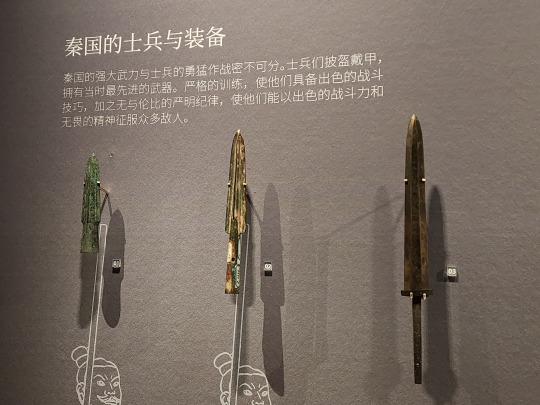
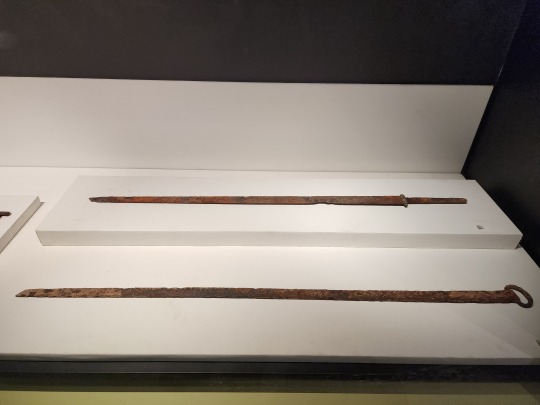
A suit of armor made out of stone from Qin Shihuang's mausoleum. These armor sets weigh about 18 kg or 39.7 lbs each, which is........actually not too bad. There are specialized armor sets in later dynasties that can weigh 30 kg or 66 lbs.
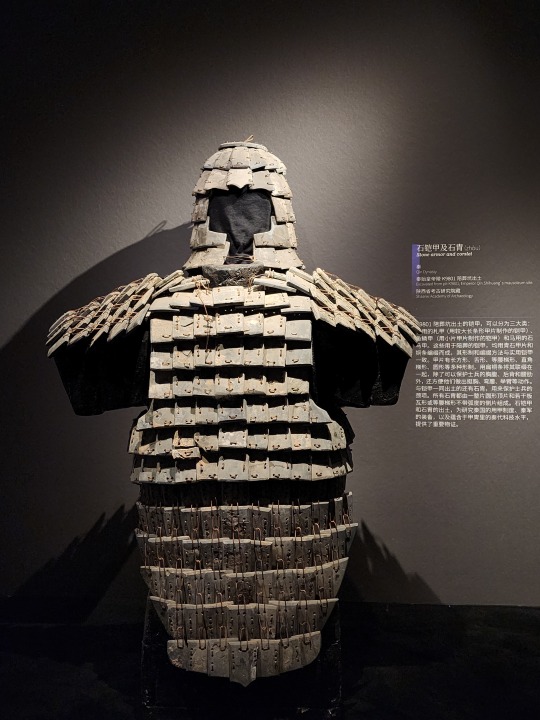
#2024 china#xi'an#china#shaanxi history museum qin and han dynasties branch#chinese history#qin dynasty#han dynasty#warring states period#three kingdoms#history#archaeology#mdzs
79 notes
·
View notes
Text

China responds to Rubio’s remarks on South China Sea after his phone call with Philippine FM
In response to a U.S. State Department statement claiming new U.S. Secretary of State Marco Rubio discussing Beijing’s “dangerous and destabilizing actions in the South China Sea” with his Philippines counterpart Enrique Manalo over phone and underscoring the “ironclad” U.S. defense commitment to Manila, Chinese Foreign Ministry spokesperson Mao Ning said on Thursday that the U.S. is not a party to the South China Sea issue and has no right to interfere in the maritime issues between China and the Philippines.
#China#imperialism#Marco Rubio#Donald Trump#Philippines#South China Sea#Mao Ning#new cold war#Struggle La Lucha
35 notes
·
View notes
Text
US’ NED ‘Mastermind’ Behind Global Separatist Riots, Color Revolutions, Political Crises: Chinese FM Report
— Global Times | May 07, 2022

US Democracy. Illustration: Liu Rui/Global Times
The National Endowment for Democracy (NED), as one of the US government's main "foot soldiers," "white gloves" and "democracy crusaders," has become the mastermind behind separatist riots, color revolutions and political crises around the world, subverting lawful governments and cultivating pro-US puppet forces under the pretext of promoting democracy, said a fact sheet released by Chinese Foreign Ministry on Saturday.

#US 🇺🇸 Democracy#US’ NED#Mastermind#Global Separatist Riots#Color Revolutions#Political Crises#National Endowment for Democracy (NED)#Democracy Crusaders#Pro-US puppet Forces#Chinese Foreign Ministry
0 notes
Text
LMK S5 trailer, Chinese pantheon infodump, and some ideas
…Man, normally, I feel the urge to write fix-it AUs after rewatching episodes and coming across particularly bizarre theories and takes, not before the new season's even out.
Thanks, S5 trailer.
Consider this your spoiler warning, because the rest of this post will all be my personal opinions about a few major story beats that were revealed + the rough outline for a fix-it AU.
It's also a bit ranty, and features some criticisms of the general narrative, so if that's not your cup of tea, feel free to avoid this one.
Li Jing becoming JE/the regent of the Celestial Realm is just hilariously absurd. I mean, it makes a teeny tiny bit more sense than the "Nezha will be the new JE" fan theory, but that's not a very high bar.
1) In-universe, he had done a grand total of nothing while shit was hitting the fan, and only showed up after it was all over. Which, tbh, isn't too far from his role in FSYY. No, wait, at least in FSYY, he killed Luo Xuan via a pagoda to the head, after the guy had all his fire-based magical treasures neutralized and taken away by Princess Longji.
Yeah, congrats, LMK's Li Jing, you've somehow become even more useless than your FSYY and JTTW counterparts——which is a true feat.
2) Even if someone's making him JE/regent, it wouldn't be the Ten Kings. To put it simply: the Underworld doesn't have that authority. They are the most pathetic of all divine bureaucracies, who pretty much only show up to get pushed around and revive the occasional dead guy in JTTW (and I still love them).
Like, they ain't no Hades or Satan. Just the 10 judges of the Dead People Supreme Court. To heavily paraphrase Di Ting in the original JTTW novel:
"How much power do Underworld gods really have? (幽冥之神,能有多少法力)" "...Certainly not enough to stop a rampaging demonic macaque who's as strong as SWK, if I say the truth out loud in here and piss him off. Just send them to the Buddha, please."
An analogy: if the Celestial Host is the imperial court, the Underworld is the ministry in charge of judicial processes and prisons. They don't even have authority over the imperial censors who answer directly to the emperor, let alone the power to determine a successor to the throne during a major crisis.
If this was to make the tiniest bit of sense, Li Jing would be the one commanding THEM, not the other way around. Or if it's Bodhisattva Ksitigarbha himself giving orders to Li Jing…for some reason.
But we know that ain't happening bc of the show's strange aversion to showing Buddhist deities on screen, not to mention it would be very OOC for Ksitigarbha, whose job is granting relief and salvation to souls in the Path of Hell, not judging and punishing them like the Ten Kings.
3) If you must make Li Jing the emperor/regent, you have a more mythos-accurate and obvious choice than the Ten Kings, considering you already got the Four Divine Beasts involved!
Yes, I'm talking about their bosses, the humanoid "directional + elemental gods": Lord Father of the East (Wood), Queen Mother of the West (Metal), Emperor Zhenwu of the North (Water).
No South though...because our mythos can't agree on a single directional god of the South, but for shit and giggles, just imagine Zhurong, Yandi, Huaguang, and the Star of Fiery Virtues all sitting on the same narrow bench, staring awkwardly at each other.
Maybe we can have Ziwei, Great Emperor of the Central Sky and North Stars, who is one of the Four Sovereigns(四御) in Daoism (two of which could also be an alternate choice, but maybe a bit too obscure for foreign audiences).
He commands the stellar deities and heavenly bodies——which the Four Divine Beasts would technically fall under, as guardians of the four quadrants of the sky, each in charge of 7 Lunar Mansions.
4) But if you already have these deities, why the hell would any of them make Li Jing the regent? Wouldn't it be more likely for them to create a Celestial Council of Regents themselves, with Devaraja Li Jing under their command as the leader of what's left of the celestial army?
Like, you can still have them, or one of them, going after the gang and ordering Li Jing to put the fillet on SWK.
I can see Zhenwu the Demon-Vanquisher doing that, since the fillet isn't too different from what he did to Huaguang and a lot of the demons he subdued in JTTN: feeding them magical water/fire pills that would corrode/ignite their insides whenever they tried to resist.
(Yeah, compared to that, the fillet would look like the lenient option, since it's just pain and won't actually dissolve/cook you alive from the inside out...)
And it wouldn't be bc he thought SWK was to blame for the Brotherhood's epic fuck-up...somehow. Like, what even is that logic?!
I mean, I can kinda see the Ten Kings doing it as a pre-emptive "Don't blame us for our shitty security, blame that guy over there!" move...except they are no longer answering to any higher authorities who'd hold them responsible at that point!
"What about Li Jing?" You may ask. Yeah, WHAT ABOUT LI JING? Why does Li Jing have to get involved in this?
If he's forcing the Ten Kings to pass judgement on the gang (which surely doesn't look like it in the trailers), why's he enlisting the help of the weakest faction and not, y'know, his celestial soldiers and other gods?
If the Ten Kings get Li Jing to be their enforcer...well, how the Eighteen Hells did they manage that? What could the Ghost Supreme Court and their crappy prison-torture chamber-soul customs office complex even offer Li Jing as a bribe?
And if their goals were to avoid responsibilities by blaming someone else, how stupid did they have to be to actively involve/create a higher authority who can punish them once the cat gets out of the proverbial bag, instead of, I dunno, just stay where they are and keep their head down???
So in my fix-it AU, it's more of a "Better safe than sorry" scenario, where every demon working for the new Celestial Council must prove their loyalty via swallowing the water/fire pill, now that even more dangerous demons have escaped and are running around in the aftermath of S4.
And Great Sage and company are not exempt from that new law either——"If you are truly righteous and Not Like Them and not planning to rebel, what's there to be afraid of?"
Horrified by the Demon-Vanquishing Mansion's 16th century standards of "justice" and "mercy", they naturally would not have any of it, and thus the conflict begins.
Not only would this show the fallout of Azure's misguided rebellion——that, in trying to make a better world, he had made it 120% worse for both humanity and demonkind in less drastic and more realistic ways aside from dooming reality to irreversible destruction, it would also help with the major show-not-tell problem about Celestial cruelty bc the "good guys" in power saw no problem with this kind of shit.
If you want your lawful antagonists who take Order to its extremes, the warrior sovereign in black leading an elite army of demon-hunters + penal legions made of "reformed" demons would be a better choice than the Ghost Supreme Court, don't ya think?
(Fun fact: in Zaju plays, Zhenwu was often said to be the boss of Nezha and Erlang, so him commanding Li Jing wouldn't be too out of place either.)
Now, you may ask, why do I even care? After all, isn't it clear that the show is neither mythos-accurate nor trying to be, considering the JE got K.O.ed by a Bodhisattva's cat of all things?
Not to mention the season's not even out yet, so why jump to conclusions so quickly? Maybe the actual episodes will have explanations that make sense. Relax.
...Cause I don't mind less-than-stellar animations if the story's good, and since I keep noticing the less-than-stellar animations, it clearly isn't good enough.
Also, it's not like it's only the implications that are absurd——my problem is with the whole premise of "Li Jing becoming the new JE/Regent" and "The gang is prosecuted by the Ten Kings for bullshit reasons, even though these guys should not, and never have the power to enforce anything over SWK."
I don't like calling narrative choices "wrong" per se, and prefer to see it on a gradient of "least to most narrative potential". When it comes to adaptations, if the option that is faithful to the original work will result in a less interesting story, then I'll happily take the one that isn't as faithful and takes creative liberties, but makes a better story.
And here, I feel like being faithful to the Chinese mythos inspirations will add to the narrative potential instead of subtract from it, and the idea they come up with kinda...goes against how Chinese pantheons work, in a very simplified and "westernized" manner.
Mostly bc I am a Chinese Underworld mythos lover and think they deserve better than being ominous Hades/Grim Reaper knockoffs. And out of all the possible Chinese gods, Nezha's asshole dad is the least qualified or interesting candidate to fill in the power vaccum left by JE's death.
#lego monkie kid#lego monkie kid s5#lmk s5#lmk s5 spoilers#monkie kid spoilers#fix it au#chinese mythology#li jing#lmk li jing#journey to the west#investiture of the gods#lmk critical#lmk season 5#chinese underworld#chinese gods
72 notes
·
View notes
Text
Asian slaves, indigenous Americans, and identity in colonial era Mexico
The Spanish Philippines had a diverse slave population for local labor and export, including Filipino Indians [i.e. natives; indios], Muslim war captives (moros), and foreign slaves from as far away as Portuguese India.
… Upon their arrival, chino slaves [i.e. any Asian slave, not just Chinese] were absorbed by the urban economy of Mexico City, where they mainly worked as domestic servants or in textile mills (obrajes) … For their part, working in the city provided chinos with some possibilities for manumission. Chinos in domestic service were especially apt to embrace the limited opportunities available to them and to experience some social mobility. In the obrajes, chinos had few of the freedoms given to domestic servants, but they did benefit from government oversight of the industry. During official visits, chino slaves appealed for protection from overt exploitation by claiming that they were Indians (even if they were from Portuguese India). Remarkably, visiting inspectors listened to their complaints, and they often responded by liberating individual chinos under the assumption that they were indeed native vassals and could thus not be held in bondage. The overall experience of chinos in the viceroyal capital confirms the benefits of living close to the center of colonial power.
The presence of free indigenous immigrants from the Spanish Philippines in Mexico reinforced the idea that all chinos were Indians. The complex governing structure of colonial Mexico involved two republics or political communities (the república de indios and the república de españoles); this organization separated the indigenous majority from everyone else to facilitate the collection of tribute and the ministry of the Catholic Church … [N]ative immigrants from the Philippines purposely sought to confirm their membership in the Republic because corporate status provided personal advantages. They asked to be tallied in tribute rolls in Mexico to benefit from concomitant privileges, such as trading rights and legal representation through the General Indian Court. At the same time, free Filipinos were frequently confused with chino slaves - a situation that had serious consequences for Filipinos' relations with colonial institutions and enslaved individuals. Some immigrants resented having their indigenous identity questioned and sought to maintain a sense of their Indian-ness by keeping their distance from chino slaves. The majority, however, expressed solidarity with chino slaves. Filipino artisans, for example, took on chino slaves as apprentices and taught them marketable skills. Similarly, Filipino traders incorporated chinos into their own credit networks to facilitate self-purchase.
Individual chinos who were manumitted also embraced an Indian identity, regardless of whether they were from Goa, Macau, or other places in South and Southeast Asia. In this way, chinos challenged official attempts to define them solely as former slaves. Instead, they sought to join the free republic. The possibility for this kind of social integration caused widespread concern among slave owners. To defend their property rights, masters started to brand chino slaves on the face, rather than on the chest or arm as they did with Africans, in order to dissuade them from fleeing and "passing" as free Indians. This horrifying development shows that Indian communities welcomed runaway chino slaves and, by extension, that slave owners sought visible markers of their slaves' status.
Excerpt from the Introduction to “Asian Slaves in Colonial Mexico: From Chinos to Indians” (2014) by Tatiana Seijas
115 notes
·
View notes
Text
The two sides, represented by Iwaya and Wang Yi, China’s top diplomat and a former ambassador to Japan, reached a 10-point consensus at the 2nd meeting of High-Level Consultation Mechanism on People-to-People and Cultural Exchanges between China and Japan, the first such meeting in five years, according to the Chinese foreign ministry.
1. vigorously promote youth exchange visits and encourage and support studies and tours between the two countries. 2. deepen cooperation in the field of education, strengthen the mutual exchange of students, and support the establishment of sister school relationships between primary and secondary schools, as well as inter-institutional cooperation between higher education institutions of both countries. 3. support cooperation in the tourism industry and introduce more facilitation measures to promote mutual visits between tourists from both countries. 4. build more bridges for exchange between friendly cities, and actively utilize mechanisms and platforms such as the China-Japan Governors Forum, China-Japan-Korea Cultural Exchange Year, and East Asian City of Culture to expand friendly exchanges between local and civil society in both countries. 5. strengthen sports exchange and cooperation, and mutually support the successful hosting of important sporting events such as the 2025 Harbin Asian Winter Games and the 2026 Aichi-Nagoya Asian Games. 6. support continued cooperation in entertainment industries including film and television, music, publishing, animation, and gaming. Facilitate mutual visits of high-level artistic groups and support the translation and publication of classic works from both countries. 7. enhance exchange and cooperation between media outlets and think tanks, playing a positive role in bilateral relations, and focus on improving public opinion and the media environment. Support both sides in developing exchange and cooperation in new media circles, and encourage positive content creators from both countries to interact with each other. 8. conduct exchanges between women's organizations to share experiences on promoting gender equality and common development. The Chinese side invites the Japanese side to participate in the Global Women's Summit commemorating the 30th anniversary of the Beijing World Conference on Women. 9. leverage the 2025 Osaka-Kansai World Expo into a platform for exchange and friendship between the peoples of both countries. The Chinese side supports Japan in hosting the event, while the Japanese side welcomes China's participation and will provide assistance for the construction and operation of the China Pavilion. 10. hold the 3rd meeting of the High-Level Consultation Mechanism on People-to-People and Cultural Exchanges between China and Japan.
21 notes
·
View notes
Text
2023: Leviev on Russia-China Summit and Tactical Nuclear Weapon Deployment Friction
The Ukrainian newspaper Korrespondent, quoting exile Russian military analyst Ruslan Leviev of the Conflict Intelligence Team. argues the Xi-Putin summit was a failure, and was ‘apparently’ shortened by a day [seen no reference to his elsewhere, perhaps Leviev has his sources?], and the Russian deployment of tactical nuclear weapons to Belarus is becoming a sore point in Russia-China…

View On WordPress
#Belarus#Chinese#Chinese-Russian#foreign ministry#PRC#press spokesperson#Putin#Russia#Russian Federation#Sino-Russian#summit#tactical nuclear weapon#Xi Jinping#中国
0 notes
Text

⚠️ WARNING: GRAPHIC FOOTAGE⚠️ 🔞
[ 📹 Children are among those crushed to death under the rubble of their home after being bombed by the Israeli occupation army in the city of Rafah, in the southern Gaza Strip, today. The Israeli occupation army began its Rafah operation last night by openly carpet bombing the eastern neighborhoods of Rafah City, killing and wounding dozens of innocent civilians.
📈 The current death toll in Gaza now exceeds 34'789 Palestinians killed and another 78'204 wounded since Oct. 7th ]
🇮🇱⚔️🇵🇸 🚀🚀🏘️💥🚑 🚨
ISRAELI OCCUPATION FORCES BEGIN "LIMITED OPERATION" IN EASTERN RAFAH AS PROMISES OF FULL-BLOWN INVASION CONTINUE WITH "GREEN LIGHT" FROM US ADMINISTRATION
On the 214th day of "Israel's" ongoing special genocide operation in the Gaza Strip, the Israeli occupation forces (IOF) committed a total of 6 new massacres of Palestinian families, resulting in the deaths of no less than 54 Palestinian civilians, mostly women and children, while another 96 others were wounded over the previous 24-hours.
It should be noted that as a result of the constant Israeli bombardment of Gaza's healthcare system, infrastructure, residential and commercial buildings, local paramedic and civil defense crews are unable to reach countless hundreds, even thousands of victims who remain trapped under the rubble, or who's bodies remain strewn across the streets of Gaza.
This leaves the official death toll vastly undercounted, as Gaza's healthcare officials are unable to accurately tally those killed and maimed in this genocide, which must be kept in mind when considering the scale of the mass murder.
The United States has given the "green light" to an Israeli invasion of Rafah, that's according to the Israeli occupation media today, which wrote that the "invasion of Rafah came after a message was sent to Egypt with full American coordination."
According to a report in the Hebrew media on the Rafah operation, "the American administration gave Netanyahu the green light for a limited operation that may last a few days in order to obtain a victory image that he could market to the ministers of the extreme right."
"The US will ban the transfer of ammunition and military equipment to Israel - if Netanyahu violates the agreement," the report added.
In response to the announcement, Egypt immediately condemned the operation, which resulted in the Israeli occupation forces taking full control over the Palestinian side of the Rafah border crossing.
In a statement, the Egyptian Foreign Ministry said the escalation in Rafah was a "dangerous development" that threatens the lives of more than a million Palestinians who depend on the Rafah crossing as a lifeline for the Gaza Strip, and for the safe outlet for the wounded and sick to exit the enclave for treatment and for the entry of humanitarian and relief aid.
The Egyptian Foreign Ministry called on the Israeli authorities to "excercise the utmost restraint and to avoid brinkmanship with long-term impact, which would threaten the fate of efforts made to reach a sustainable truce within the Gaza Strip."
The Egyptian Foreign Ministry also called upon the international community to intervene and exert the "necessary pressure" to defuse the current situation and allow diplomatic efforts to achieve their desired results.
At the same time, China also condemned the Israeli operations in Rafah, calling on the Israeli occupation to "stop attacking Rafah" after the Israeli authorities announced they had taken control over the Palestinian side of the Rafah border crossing.
In a statement, Chinese Foreign Ministry spokesperson, Lin Jian stated, "China strongly calls on Israel to respond to the great demands of the international community, stop attacking Rafah, and do everything in its power to avoid a more serious humanitarian catastrophe in the Gaza Strip."
The Chinese Foreign Ministry spokesperson further said that China "expresses its deep concern over Israel's intention to launch a ground military operation against Rafah."
"War and violence cannot fundamentally solve the problem and cannot achieve real security," Lin added.
Immediately following the announcement of the "limited" operation in Rafah, widespread carpet bombing of Gaza's southernmost city began, with the homes and businesses of Palestinians targeted with American-made bunker-busting dumb bombs dropped by the Israeli occupation army.
During the assault, occupation forces bombed the residential home of the Al-Hams family in the Al-Geneina neighborhood, east of Rafah, obliterating the house and killing four civilians, followed by another IOF airstrike on the Abdel-Al family in the administrative district in central Rafah, murdering one family member and wounding a number of others.
Elsewhere in Gaza, the Israeli occupation army launched several raids on the towns of Beit Hanoun and Jabalia in Gaza's north, while Israeli air forces bombarded the Yarmouk area, east of Jabalia, and also targeted a home belonging to the Al-Durailmi family, in the Al-Sabra neighborhood of Gaza City, slaughtering three civilians and wounding several others.
Additionally, a Palestinian citizen was killed and others wounded following an Israeli airstrike on the residential home of the Bakr family in the Al-Shati Refugee Camp, west of Gaza City on the eastern Mediterranean shore.
Following the seemingly endless bombing and shelling of the Israeli army, local civil defense crews managed to recover the bodies of several Palestinian civilians found under the rubble of their homes, including the homes of the Abu Amra, Al-Shamali, Al-Hams and Abdel-Al families, all of which were bombed overnight and into the morning, killing dozens of citizens.
In the bombing of the Abu Amra family home, three civilians were killed, including a child.
Meanwhile, in yet another atrocity, IOF warplanes bombarded a residential home in the Tal al-Sultan neighborhood, west of Rafah, in Gaza's south, martyring five civilians and wounding a number of others.
According to sources with the Kuwait Specialized Hospital in Rafah City, at least 20 people were killed and dozens of others wounded in the overnight and dawn bombings of Gaza's southernmost city.
They said rescue crews, ambulance, paramedics and civil defense personnel recovered the bodies of four civilians, including two women, while another 18 were wounded, following the Israeli bombing of the Al-Darbi family home, in the Tal al-Sultan neighborhood, west of Rafah.
In further criminal attacks, IOF fighter jets launched airstrikes targeting the civilian home of the Al-Afifi family family, also in the Tal al-Sultan neighborhood of Rafah, wounding several Palestinians, while another airstrike conducted against a school sheltering displaced families in Gaza City killed one and wounded many others.
IOF aircraft further targeted a residential home belonging to the Al-Shamali family, adjacent to the Abu Bakr Mosque in the Brazil neighborhood of Rafah, killing and maiming several citizens.
Elsewhere, occupation forces focused their bombing in Gaza's north on the Al-Zaytoun, Tal al-Hawa, Sheikh Ajlin, and Al-Sabra neighborhoods of Gaza City, while another bombing targeted a civilian residence in the Al-Atatra area of Beit Lahiya.
In further assaults, an IOF attack helicopter of the Apache variety was seen opening fire on neighborhoods south of the Tal al-Hawa neighborhood, southwest of Gaza City.
Military and armored vehicles of the Israeli occupation forces have also been built-up just 200 meters from Rafah border crossing, some of which fired shells into the city according to some reports, while the Egyptian side said the occupation army was conducting limited operations near the crossing and would withdraw from its vicinity tomorrow morning.
As a result of "Israel's" ongoing special genocide operation in the Gaza Strip, the death toll among the local population has risen yet again, now exceeding 34'789 Palestinians killed, including well over 14'690 children and 10'000 women, while another 78'204 others have been wounded since the start of the current round of Zionist aggression, beginning with the events of October 7th, 2023.
May 7th, 2024.
#source1
#source2
#source3
#source4
#source5
#source6
#source7
#source8
#videosource
#graphicsource
@WorkerSolidarityNews
#gaza#gaza strip#gaza news#gaza war#war in gaza#genocide in gaza#israeli genocide#genocide#israeli occupation#israeli war crimes#israeli occupation forces#israel#war crimes#crimes against humanity#palestine#palestine news#palestinians#free palestine#end the occupation#israel palestine conflict#war#middle east#politics#news#geopolitics#world news#global news#international news#breaking news#current events
40 notes
·
View notes
Text
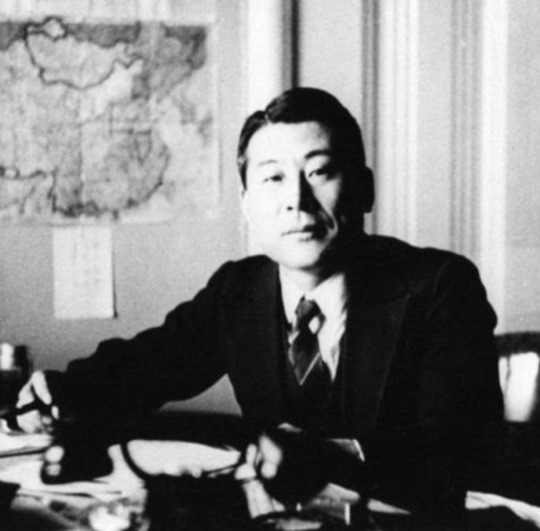
Chiune Sugihara was a Japanese diplomat in Lithuania who put his family and career at risk by issuing thousands of hand-written transit visas to Jewish refugees fleeing Eastern Europe.
Chiune was born to a middle class family in Mino, Japan on the first day of the 20th century – 1/1/00. In elementary and high school he was a top student, and his father wanted him to become a doctor. Chiune’s own dream was to enter the foreign service, and he deliberately failed the medical school entrance exam by writing only his name on the test. Instead Chiune attended Waseda University and majored in English. He also joined a Christian fraternity to practice his English.
In 1919, Chiune passed the Foreign Ministry Scholarship exam, and served in the Japanese Imperial Army as a 2nd Lieutenant stationed in Korea. He resigned his commission in 1922 and trained for the Foreign Ministry, learning Russian and German in addition to English. He aced the qualifying exam and was sent to work in the foreign office in Harbin, China.
Chiune’s strong moral compass led him to resign his post as Deputy Foreign Minister in Manchuria because of rising Japanese violence against the Chinese (just two years later was the horrific Rape of Nanking by the Japanese Imperial Army.) Chiune returned to Japan, where he married Yukiko Kikuchi. They later had four sons.
Next Chiune went to Helsinki, Finland, where he worked as a translator for the Japanese delegation. In 1939, Chiune became vice-consul of the Japanese embassy in Kauna, Lithuania. Part of his job was to find out if Germany planned to attack the Soviet Union, and to relay any information about this to his bosses in Berlin and Tokyo.
In 1940, the Soviet Union occupied Lithuania. At that time, approximately 1/3 of Lithuanians were Jewish, many of them Torah scholars. The USSR viciously persecuted Jews, especially religious ones, and the Jews of Lithuania were desperate to escape the country – especially because Nazi Germany was occupying more and more of Eastern Europe and would soon be in Lithuania. Hundreds of them, mostly Orthodox, visited the Japanese consulate to beg for exit visas to Japan. The official Japanese policy was that candidates for visas must go through elaborate bureaucratic procedures and pay significant sums of money. Chiune contacted his superiors at the Japanese Foreign minister to ask if the rules could be relaxed to help Jewish refugees. His request was denied, as were his next two requests.
Chiune could have thrown up his hands and told the Jews there was nothing he could do for them, but instead, as he did in China, he was governed by his strong sense of right and wrong, rather than soulless bureaucrats. He ignored his orders and started issuing ten-day visas for Jews to travel through Japan on their way to safe havens like Shanghai, China, where 20,000 Jews rode out the war safely.
As word got out about the Japanese visas, Jews from all over Lithuania as well as Poland began to swarm Chiune’s office. He simply wouldn’t say no to anybody, and spent 18-20 hours a day (!) painstakingly writing visas by hand. He created a month’s supply of visas every single day from August to early September 1940, providing an escape route for thousands of Jews. On September 4, the Japanese consulate in Kauna was closed and Chiune had to leave the country. He was determined to create as many transit visas as possible, and continued doing so up until the last minute. At Kanuas Railway Station, a crowd of Jews gathered to say goodbye. Right before boarding the train, Chiune bowed deeply and cried out, “Please forgive me! I cannot write anymore. I wish you the best!” Someone in the crowd shouted, “Sugihara! We’ll never forget you! I’ll surely see you again!”
Chiune was reassigned to East Prussia, then Prague, and then Bucharest, Romania. When the Soviet Union occupied Lithuania in 1944, Chiune and his family were imprisoned in a POW camp for a year and a half. Finally they were released in 1946 and returned to Japan, but the foreign office had heard about his unauthorized visas, and he was forced to resign. At about this time, the Sugihara’s youngest son died of leukemia at age seven.
Unemployable in Japan, Chiune made use of his excellent Russian language skills and spent the next 16 years working in the Soviet Union while his wife and sons stayed in Japan. Chiune’s exceptional heroism was unknown for many years, until 1968, when he was contacted by Yehoshua Nishri, an attache working at the Israeli consulate in Tokyo. Nishri spent his youth in Poland, and heard stories of the legendary Japanese hero. Nishri made it his mission to publicize Chiune’s heroic acts, and the next year, 1969, Chiune traveled to Israel as an honored guest of the Israeli government. Jews he’d saved lobbied for him to be recognized as Righteous Among the Nations by Israeli Holocaust Memorial Yad Vashem, and in 1984 he received the honor. At that time he was too sick to travel, so his wife and son Nobuki accepted the award on his behalf.
Chiune was asked why he risked everything to help thousands of strangers. He answered, “You want to know about my motivation, don’t you? Well. It is the kind of sentiments anyone would have when he actually sees refugees face to face, begging with tears in their eyes. He just cannot help but sympathize with them. Among the refugees were the elderly and women. They were so desperate that they went so far as to kiss my shoes. Yes, I actually witnessed such scenes with my own eyes. Also, I felt at that time, that the Japanese government did not have any uniform opinion in Tokyo. Some Japanese military leaders were just scared because of the pressure from the Nazis; while other officials in the Home Ministry were simply ambivalent. People in Tokyo were not united. I felt it silly to deal with them. So, I made up my mind not to wait for their reply. I knew that somebody would surely complain about me in the future. But, I myself thought this would be the right thing to do. There is nothing wrong in saving many people’s lives… The spirit of humanity, philanthropy… neighborly friendship… with this spirit, I ventured to do what I did, confronting this most difficult situation – and because of this reason, I went ahead with redoubled courage.”
Chiune Sugihara died in Japan on July 31, 1986. Despite being a hero in Israel, and among Jews worldwide, he was completely unknown in his own country. Even his own children didn’t know what he had done. A huge delegation from around the world attended Chiune’s funeral, and only then did he become known in Japan.
Chiune received many awards and accolades, most of them posthumous. Among them are Sugihara Streets in Vilna, Lithuania, and Jaffa and Netanya in Israel. There is a Sugihara House Museum in Kaunas, and a park in Vilna where 200 trees were planted on his 100th birthday. There is a life-sized statue of him in Little Tokyo in Los Angeles, featuring a plaque with a quotation from the Talmud, “He who saves one life, saves an entire world.” In 1998, Chiune’s widow Yukiko traveled to Israel and was warmly received by survivors who’d been saved by her husband. There is a Sugihara park in Jerusalem, and he was featured on an Israeli postage stamp in 1998. The Lithuanian government declared 2020 “The Year of Chiune Sugihara.” He has been the subject of multiple works of art, including books, films and a play.
It’s estimated that over 100,000 people are alive today because of the brave actions of Chiune Sugihara.
112 notes
·
View notes
Text
Chinese Foreign Ministry official addresses the International Court of Justice in the case challenging the legality of the Israeli occupation of Palestine.
#palestine#gaza#free palestine#israel#icj genocide case#icj case#jerusalem#icj#i stand with palestine#فلسطين#free gaza#israel is a terrorist state#israeli war crimes#unga#israeli terrorism#israelis are terrorists#israel is committing genocide#israel is a war criminal#israeli occupation
56 notes
·
View notes
Text
Big government news. Several governing factions in Gaza, including the major ones Hamas and Fatah, have signed a unity deal brokered/mediated by China.
These two main factions have a lot of major disagreements, most notably about armed resistance, but have declared they will work together to resist Israel's attacks. They also say they will establish an interim reconciliation government if and when the genocide ends.
Many people doubt they'll be able to overcome their differences to be an effective team, but I guess we'll see.
The fact that China is intimately involved in this agreement is absolutely going to freak out the US Government. Keep an eye out for rising anti-Chinese rhetoric and action in the coming months.
The US and Israel are very upset by this development, representatives of both countries declaring there can be no stop to the attacks until Hamas is destroyed. But remember that to them, all Palestinians are Hamas.
21 notes
·
View notes
Text
Hype on Lai's US Transit 'Untenable'; Stopover Expected To Be 'Low-Key' Amid De-escalating China-US Tensions
— Global Times Staff Reporters | July 18, 2023

Taiwan Question Illustration: Chen Xia/Global Times
Before the planned stopover in the US by deputy leader of Taiwan Island Lai Ching-te in August, politicians from the island and the US tried to pre-empt responses and reactions from the Chinese mainland. Their argument of "following customary," however, is completely untenable, said Chinese experts on Tuesday, noting that a possible low-key transit will not change its nature.
China has lodged serious representations with the US side over the matter and will closely follow the situation and take resolute and strong measures, according to Chinese Foreign Ministry.
Lai, a front-runner in the Island's election for regional leader who currently serves as deputy regional leader, has been appointed to lead a delegation to attend the inauguration ceremony of Paraguayan president-elect Santiago Pena in August. He will stop over in the US on the way to Paraguay, according to a local official, who on Monday described the stopover as "customary."
US Secretary of State Antony Blinken also said the transit was "routine" on Monday, citing that 10 deputy regional leaders of Taiwan island have done so. He even warned that the Chinese mainland should not "use it as a pretext for provocative actions."
However, Chinese experts pointed out that the argument of "custom" or "routine" is totally untenable.
"It is easy to refute," Lü Xiang, a research fellow at the Chinese Academy of Social Sciences, told the Global Times on Tuesday. "If a criminal committed a crime but was not punished, it does not mean the criminal is free to commit that crime again."
"Low key, private and unofficial" is Lai's transit expected to be, US media outlet Bloomberg reported, citing a senior Biden administration official. The US' planned approach is in line with its recent easing of diplomatic ties with the Chinese mainland, analyst said.

Blind To Reality! By Liu Rui, July 18, 2023
The Chinese mainland has sent very strong and clear signals in the events of Pelosi's provocative visit to Taiwan island and regional leader Tsai Ing-wen's transit stop in the US, making it crystal clear to the US that the Taiwan question is the most sensitive and significant question in China-US relations, said Lü.
He noted that in the recent high-level exchanges between China and the US, there have been fewer antagonistic expressions on the part of the US. "Now that the US sees de-escalating tensions, they are expected to deal with this matter in a low-key manner."I’m
Nonetheless, a low-key manner will not change the nature of the event which is an official interaction firmly being opposed, experts noted. The Chinese mainland will continue to closely follow relevant developments.
While Blinken referred to the "status quo" in the Taiwan Straits that the US "has no desire to change," Chinese observers pointed out that the so-called status quo has not existed since then-US house speaker Nancy Pelosi's reckless visit to the island in August 2022.
"Cross-Straits relations have entered a new normal, which is that the mainland has increased its ability to control air and sea space across the Straits in order to deter interference," said Lü. "What the US is realizing is that its ability to intervene in the Straits' situation has become weaker and weaker."
Politicians on Taiwan island who still fantasize that the US has the ability to support their secessionist moves will keep exaggerating the support they receive from Washington, saying that they have been treated with courtesy, which is their usual rhetoric to win votes, he noted. "There is nothing else for them to rely on."
China has lodged serious representations with the US side over the matter, said Chinese Foreign Ministry spokesperson Mao Ning at Monday's regular news conference.
China firmly opposes any form of official interaction between the US and the Taiwan region, firmly opposes any visit by "Taiwan independence" separatists to the US in any name or under whatever pretext, and firmly opposes the US's conniving with and supporting the "Taiwan independence" separatists and their separatist activities in any form, she said.
"The Taiwan question is the very core of China's core interests and the first red line that must not be crossed in China-US relations," said Mao. "We urge the US to abide by the one-China principle and the three China-US joint communiqués, act on its leaders' commitment including not supporting 'Taiwan independence,' stop official interaction with Taiwan, stop upgrading its substantive exchanges with the region, and stop sending any wrong signal to the 'Taiwan independence' separatist forces."
#China 🇨🇳#Taiwan 🇹🇼#Taiwan Island Lai Ching-te#Paraguayan President-elect Santiago Pena#Paraguay 🇵🇾#US 🇺🇸#Lü Xiang#Chinese Foreign Ministry
0 notes